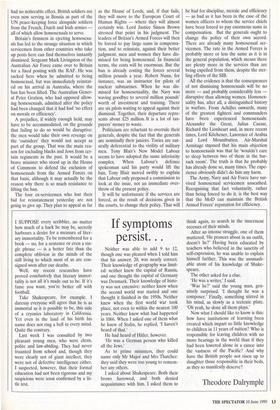If symptoms persist. . .
I SUPPOSE every scribbler, no matter how much of a hack he may be, secretly harbours a desire for a measure of liter- ary immortality. To be remembered for a book — no, for a sentence or even a sin- gle phrase — is a better fate than the complete oblivion in the minds of the still living to which most of us are con- signed soon after our deaths.
Well, my recent researches have proved conclusively that literary immor- tality is not all it's made out to be. If it's fame you want, you're better off with football.
Take Shakespeare, for example. I daresay everyone will agree that he is as immortal as it is possible to be, this side of a cryonics laboratory in California. Yet even in the land of his birth his name does not ring a bell in every mind. Quite the contrary.
Last week I was consulted by two pleasant young men, who were clean, polite and law-abiding. They had never truanted from school and, though they were clearly not of giant intellect, they were not of defective intelligence either. I suspected, however, that their formal education had not been rigorous and my suspicions were soon confirmed by a lit- tle test. Neither was able to add 9 to 12, though one was pleased when I told him that his answer, 20, was nearly correct. Their knowledge of geography was limit- ed: neither knew the capital of Russia, and one thought the capital of Germany was Denmark. Their knowledge of histo- ry was not extensive: neither knew when the second world war started and one thought it finished in the 1950s. Neither knew when the first world war took place, not even to within the nearest 100 years. Neither knew what had happened in 1066. When I asked one of them what he knew of Stalin, he replied, 'I haven't heard of that.'
He had heard of Hitler, however.
'He was a German person who killed all the Jews.'
As to prime ministers, they could name only Mr Majoi and Mrs Thatcher: they said they were too young to remem- ber any others.
I asked about Shakespeare. Both their brows furrowed, and both denied acquaintance with him. I asked them to think again, to search in the innermost recesses of their minds.
After an intense struggle, one of them muttered, 'He prances about in an outfit, doesn't he?' Having been educated by teachers who believed in the sanctity of self-expression, he was unable to explain himself further. This was the unsmash- able atom of his knowledge of Shake- speare.
The other asked for a clue.
'He was a writer,' I said.
Was he?' said the young man, gen- uinely surprised. 'I thought he was a composer.' Finally, something stirred in his mind, as slowly as a tectonic plate. 'Oh yeah, he done all them plays.'
Now what I should like to know is this: how have institutions of learning been created which impart so little knowledge to children in 11 years of tuition? Who is responsible for leaving children with no more bearings in the world than if they had been lowered alone in a canoe into the vastness of the Pacific? And why have the British people not risen up to slaughter those responsible in their beds, as they so manifestly deserve?
Theodore Dalrymple


































































 Previous page
Previous page